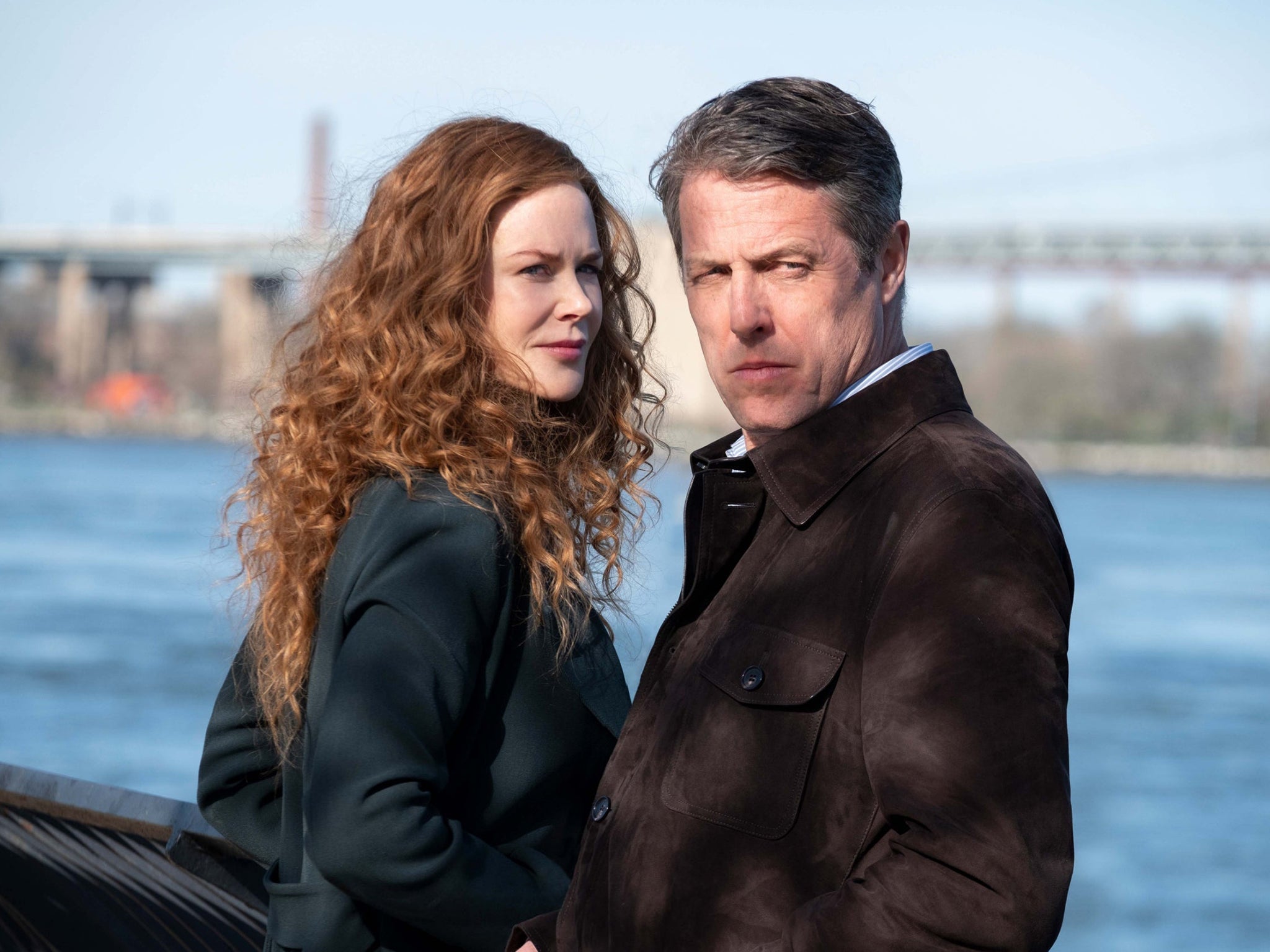The Independent's journalism is supported by our readers. When you purchase through links on our site, we may earn commission.
How The Undoing is unravelling the sexy whodunit
Nicole Kidman and Hugh Grant’s murder mystery has split critics but its pulpy world of privilege and egotists is actually anything but shallow, says our arts columnist Micha Frazer-Carroll


Your support helps us to tell the story
From reproductive rights to climate change to Big Tech, The Independent is on the ground when the story is developing. Whether it's investigating the financials of Elon Musk's pro-Trump PAC or producing our latest documentary, 'The A Word', which shines a light on the American women fighting for reproductive rights, we know how important it is to parse out the facts from the messaging.
At such a critical moment in US history, we need reporters on the ground. Your donation allows us to keep sending journalists to speak to both sides of the story.
The Independent is trusted by Americans across the entire political spectrum. And unlike many other quality news outlets, we choose not to lock Americans out of our reporting and analysis with paywalls. We believe quality journalism should be available to everyone, paid for by those who can afford it.
Your support makes all the difference.Just how much can we trust the people we love the most? It’s a nightmarish question, but one that the murder mystery genre plays on most expertly. And The Undoing, Sky Atlantic’s gripping six-part psychological thriller, which comes to a close on Monday, asks viewers that with an added dose of misdirection and Manhattan misery.
Based on the 2014 novel You Should Have Known, the series stars Nicole Kidman and Hugh Grant as Grace and Jonathan Fraser – two mega-rich New Yorkers whose lives are turned upside down by the brutal murder of a beautiful-yet-mysterious working-class woman in their community. Before long, we discover that Jonathan had been having an affair with Elena (the woman in question), thrusting him into the position of prime suspect, and putting his marriage with Grace in a very precarious position. What ensues is an emotionally evocative whodunnit, which explores class, trust, and crucially, ego.
The twists in almost every episode are sharp enough to make you throw everything you’d previously believed out the window. Having gone into the series cold, I spent the first few episodes deeply confused about the genre: was this a sort of high-society version of Desperate Housewives? A show about infidelity? A murder mystery? Or a courtroom drama? Five episodes in, I have now decided the answer is: all of the above.
The story’s constant handbrake turns also mean you will be sold on a new theory in almost every episode. First, I thought the murderer was undoubtedly Elena’s husband, Miguel. Then, after the discovery of the affair, and Jonathan’s subsequent disappearance, surely it had to be Jonathan. But then again, maybe it was Grace; after all, she was the one most tormented by dreamt up (or perhaps, flashback?) images of Elena’s body. And now, after a hammer was found in a violin case (that’s one you don’t get in Cluedo), episode five would have us believe that Grace and Jonathan’s 12-year-old son, Henry, did it. Some fans have also suggested that Grace's wealthy, intimidating father Franklin (Donald Sutherland) might have slept with Elena first, leading him to kill her when he discovered she was having an affair with Jonathan. But I still think it really is too close to call.
The show’s star power makes it all the more enthralling. Kidman and Grant’s rapport is scintillating, and it feels as if they are interacting with characters they have played from times gone by. Kidman’s character, Grace, is the rich, troubled wife of an unfaithful doctor, much like in 1999 erotic mystery Eyes Wide Shut. Meanwhile, Grant remarked on Monday in an interview that his own charmingly bumbling character is so sinister because he’s cemented in our collective consciousness as an awkward romcom nice guy: “It was my whole career 20 years ago,” he told The Ringer podcast. Interestingly, after his own tabloid scandal in 1995, Grant’s characters became less foppish and more a stereotypical symbol of the wealthy male ego (think About A Boy, Bridget Jones’s Diary or Music and Lyrics). And now, his character vacillates between that “arrogant man” category and a far more dangerous one – a man who may have committed murder.
This recurring theme of privilege and ego is a captivating one because it lies at the crux of our suspicions around Jonathan. In his day to day life, he is a child cancer oncologist and we see that he thrives on the saviour power dynamic between himself and his patients, basking in the praise of their vulnerable families. This type of attention, which he also gains through infidelity with Elena, is his lifeblood. But just how deep does the problem go? There’s a fantastic moment in episode four where Grace’s no-bulls*** lawyer, Haley Fitzgerald (played by Noma Dumezweni), seems to be making a pass at Jonathan. It’s deeply out of character for Haley, and one of the many moments in the series where my breath caught in my chest for a good 10 seconds. Will he cheat on Grace again? Does he really have any remorse for his past mistakes? Surprisingly, Jonathan resists, after which Haley reveals that it was just a test of his ever-fragile ego, which against all odds, he has passed.
So, yes, Jonathan is vain. But does that mean that he has the capacity to murder someone? Or is he just a neglectful husband with a God complex? These questions also come to a head in episode three when we are introduced to a concept dubbed “post-traumatic betrayal disorder” – a phenomenon whereby people who have been betrayed by a partner begin to believe that partner could be capable of anything, even murder. Jonathan’s attorney Robert suggests that this is the bias with which Grace is suffering, then tells her bluntly: “I think your husband is a bit of a dick, but not a killer." I personally am not yet sold on Robert’s theory, but the question itself says something about the fragile nature of trust, as well as the unclear bounds of misogyny.
Interestingly, The Undoing has divided critics, some of whom accuse it of being conventional or, worse, vacant. The New Yorker’s Naomi Fry called the show “empty lifestyle porn”, a genre that has received a fresh wave of scrutiny after Sofia Coppola’s luxurious father-daughter drama On the Rocks. The Undoing does certainly bear some of these hallmarks: Grace is the therapist daughter of an Upper East Side billionaire, her child attends an elite private school, her and her friends have lovely homes, and they spend most of their leisure time swanning about at fundraisers held in skyscrapers.
Others have been accused The Undoing of using “Big Little Lies formula”, a TV adaptation of a novel about the problems of rich people, brought to life by an ensemble movie star cast, including Kidman (though it was to be expected when The Undoing and Big Little Lies also share a screenwriter and producer, David E Kelley and Bruna Papandrea respectively). There are echoes of this summer’s suburban drama Little Fires Everywhere, too, a show about an obscenely rich family befriending a poor family – which, like The Undoing, is produced by the wealthy woman who stars in it.

Watch Apple TV+ free for 7 days
New subscribers only. £8.99/mo. after free trial. Plan auto-renews until cancelled

Watch Apple TV+ free for 7 days
New subscribers only. £8.99/mo. after free trial. Plan auto-renews until cancelled
But The Undoing isn’t shallow about its characters and their wealth. In fact, money is a legitimate character in the story, too. Sometimes it does fuel some admittedly unhinged behaviour, like when the Frasers attend a fancy restaurant during the lunch break of the murder trial. But as director Susanne Bier told the Boston Herald last week, that’s sort of part of the fun of it: “[The show] is sarcastic about the world of privilege, but it also allows itself to be seduced by the beauty of it, the deliciousness of it, the lavishness of it.” Perhaps Bier has simply decided that, since there has always been an escapist market for shows about the problems of the super rich, why not do something darkly interesting with that?
And The Undoing’s darkly interesting take is that you can never truly trust the millionaires. As Haley concludes about Jonathan’s behaviour: “It’s what rich, entitled people do when threatened: They conceal the ugly truths to protect themselves. And they think they can get away with it.”
On Monday night, we will all be in a better position to assess just how much this show achieves as it reaches its nail-biting conclusion – after all, a whodunnit’s big reveal is also its greatest opportunity to make broader social commentary. As a wealthy, entitled man with a serious ego, is Jonathan just a bit of a dick, or a killer? Or will the show go more in the direction of On the Rocks – light spoilers for that movie oncoming – and subvert our biases against a wealthy man to simply reveal him as an overworked and underappreciated husband? Only time will tell for The Undoing, but I personally am gearing up for all of our assumptions to once again be undone.
The Undoing concludes on Sky Atlantic, 30 November


Join our commenting forum
Join thought-provoking conversations, follow other Independent readers and see their replies
Comments